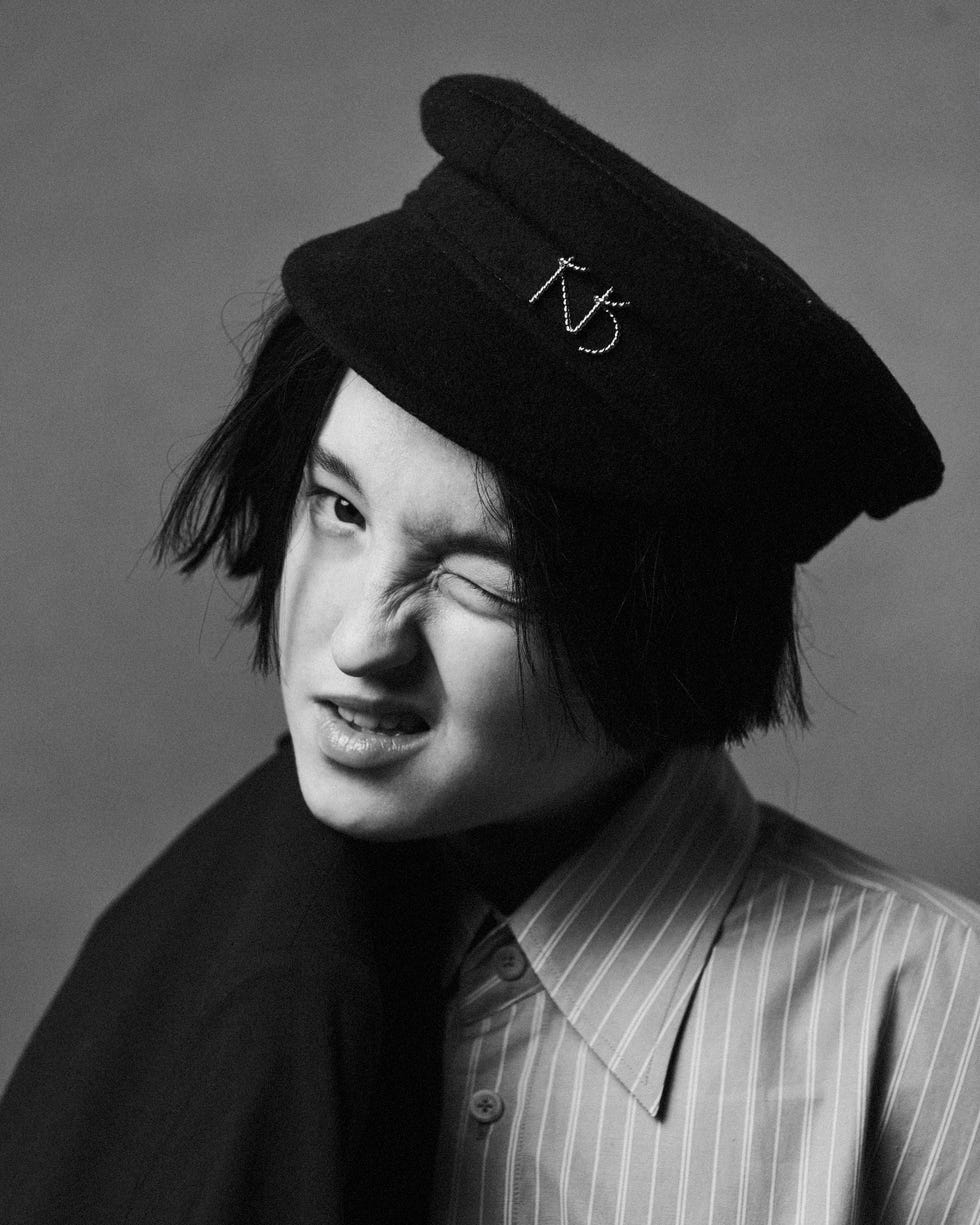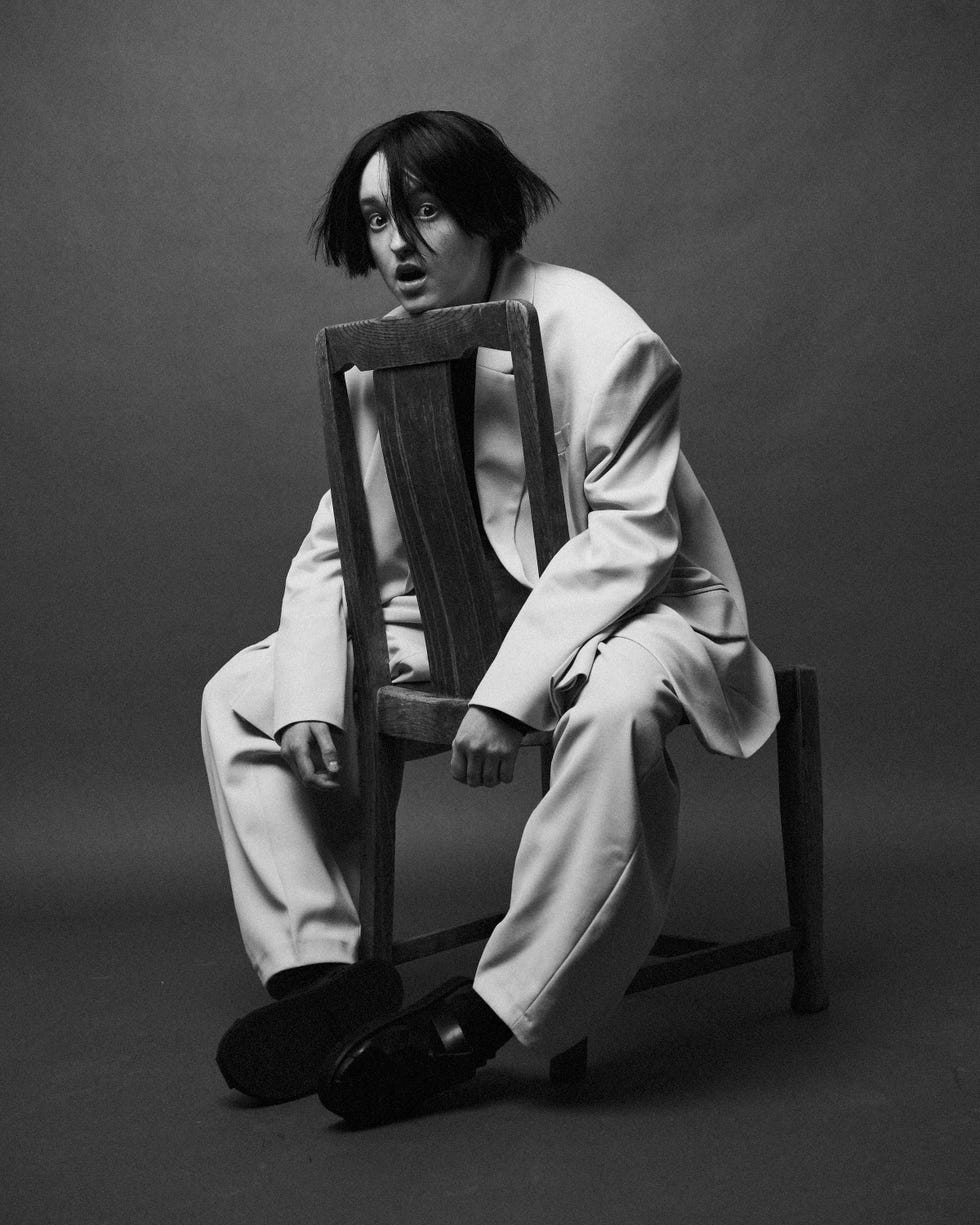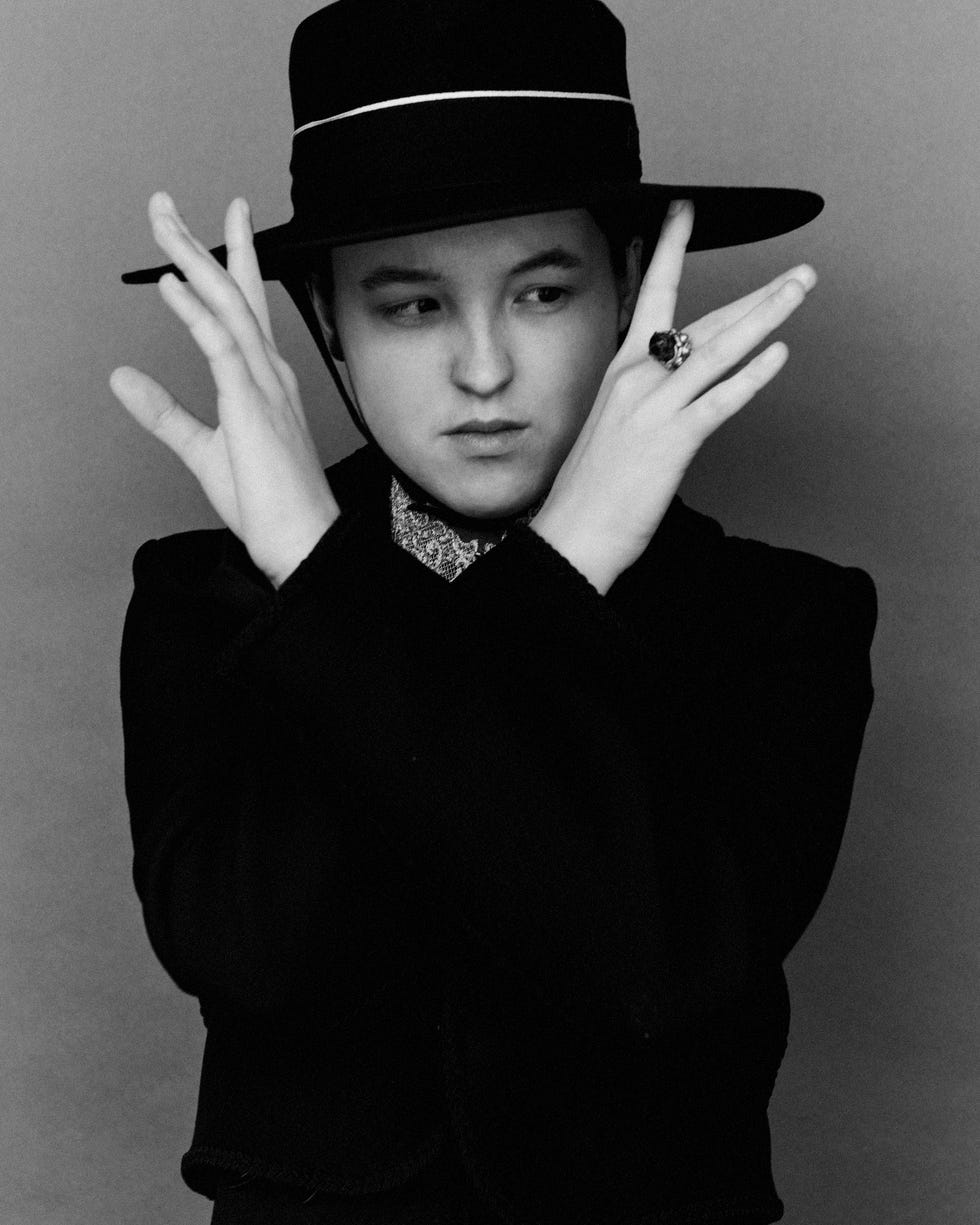Even with her guts clenched in the fist of a giant, Bella Ramsey appeared almost indomitable. This had been her effect since the moment she’d first appeared in Game of Thrones’s sixth season, as the slight but commanding preteen Lady Lyanna Mormont, swiping attention from her much more famous co-stars and prompting YouTube compilations of “Lyanna Mormont Destroying People For 2 Minutes Straight.” No one, even those who most derided the hit HBO show’s final season, could resist Ramsey’s iron stare. In one of her last scenes as Lyanna, as a CGI wight squished her ribs and her already-shredded breaths turned to gasps, Ramsey let loose a brief but blood-freezing war cry and plunged her sword into the monster’s eye. Her character tumbled to the ground and died moments later. Still, it’s the scream of determination her fans remember best.
And so “The North remembers.” Those words, spoken by Lady Mormont in season 6, helped cement Ramsey as a star even at the age of 12, though it would be several years before another HBO show was clever enough to swing her to the top of its cast billing.
This month, the now 19-year-old is entering another legendary franchise as the lead role beside Pedro Pascal in The Last of Us, adapted from the beloved PlayStation video game that sold around a million copies within a week of its release in 2013. In the horror-adventure survival series, she plays 14-year-old Ellie, whom I suspect would get along swimmingly with Lyanna, considering their shared predilection for sparring with men twice their size. Born amidst the backdrop of fungus-ravaged, zombie-infested, authoritarian-controlled America, Ellie has an inconspicuous scar on her forearm that makes her a miracle. That disfigured skin marks the remnants of a zombie bite, one she inexplicably survived without the dreaded cordyceps fungus bursting through her blood vessels and assuming control of her body. As such, there’s at least a chance—a good one—she might be the answer to a long-awaited cure.
Ellie’s reluctant caretaker in a cross-country quest to discover these supposed vaccine developers is Pascal’s Joel, a smuggler with a blunted Texas accent. At the start of the cordyceps outbreak, he lost his daughter, and so Ellie becomes the surrogate child he never wanted as her quips and determination wear at his protective steeliness. The premise is not new, but any lover of the game—and now of the show—will tell you the result is extraordinary. Joel and Ellie forge a bond that far eclipses the need for survival; at the heart of their relationship is what and who we survive for, and the morality we sacrifice in the process. But to make that dynamic sing, it was essential that The Last of Us showrunners Neil Druckmann, who worked on the original game, and Craig Mazin, of Chernobyl fame, find the right actors.
The duo saw more than a hundred auditions for Ellie, all from women and girls varying from ages 9 to their mid-twenties. In the game, preteen Ellie was voiced and motion-captured by actress Ashley Johnson, who at the time was in her late twenties. Johnson’s portrayal created a “very weird alchemic wisdom to [Ellie],” as Mazin puts it. The character is “naive and she’s a child, but she’s also really wise. She’s super smart and funny and dangerous and scared.” Mazin added, “Above all, you have to just love her. So that’s a tall order.”
When Ramsey’s audition popped up in the audition queue, Mazin recognized her instantly: “I was like, oh shit, it’s Lady Mormont.” But he quelled his inner Game of Thrones fanboy in favor of his experience as a director, knowing even the most talented actresses could be badly suited for a role as particular as Ellie. Then he watched Ramsey open her mouth, and he panicked. He was almost positive he was the only one amongst the crew who’d watched the tape so far.
“I was so freaked out that they weren’t going to see what I saw,” Mazin said. “Because in my mind, I was like, if we don’t cast Bella as Ellie, then I will go to my grave knowing that we could have made a better show than we did.”
They saw what he saw. Mazin and Druckmann met with Ramsey over a Zoom callback, for which Ramsey says she prepared with a vicious treadmill walk, during which she repeatedly muttered one of Ellie’s beloved curse words—in this case, “Motherfucker.” From there, Ramsey officially clinched the role, and Mazin had his Ellie. What he didn’t recognize, at the time, was that he’d also found the piece of himself that was most like Joel. And that Ramsey would need it.
Toxicity was perhaps inevitable. Casting a live-action adaptation of a fan-beloved franchise is a notoriously controversial enterprise, and Ramsey didn’t look like Ellie—that is, she didn’t have the almost doll-like features that had, after the game’s release, sparked comparisons (and drama) with Elliot Page. Although there was plenty of excitement upon the announcement that Lyanna Mormont would battle cordyceps, Ramsey scrolled through enough of the nastier reception to almost empathize with her naysayers. “Believe me, I had my doubts, too,” she tells me during an interview in December. “It took a long time, actually, for me to accept that I was Ellie, and that I could be her and that I was the right fit. It took me a good while, even after we finished filming.”
In his more charitable moments, Mazin understands where the backlash came from. There’s an Ellie that already exists for fans, an Ellie they love. “In this medium, there’s this new kid and they’re like, ‘Well, we didn’t want the new kid. We didn’t ask for the new kid. I don’t like this new kid. She doesn’t look like the old kid,’” Mazin says. “Then what’s going to happen, if they watch, is they’re going to be like, ‘Well, the new kid’s fine. She’s not as good as the old kid, but the new kid’s okay.’ Then they’re going to be like, ‘I kind of love this new kid.’ Then eventually they will arrive at, ‘If anybody hurts this new kid, I’ll kill them.’” The irony of this isn’t lost on Mazin, who points out that this emotional journey is exactly the one Joel goes through in the show.
And it’s one he went through himself. “I feel about [Ramsey] the way Joel feels about Ellie, which is to say, when I read people saying things that I consider to be cruel, stupid, I want to find them and kill them with my hands,” Mazin says.
The director and star developed an unusually close relationship during the year in which The Last Of Us filmed in Calgary, Canada, starting in July 2021. Upon meeting the then-juvenile Ramsey, he realized that, off-screen, the actress who’d played so many bold and insubordinate characters was, in fact, “wonderfully fragile.” They discovered a kinship in their shared proclivity for anxiety, shame, and catastrophizing, as Mazin puts it, developing a special vernacular to hold themselves aloft. They referred to standing next to each other, solitary and silent, as time spent “alone deluxe.” When asked how his day was going, Mazin might reply, “Well,” which meant not “good” but, rather, “I’m down in a well, at the bottom of a deep well.” Upon hearing this, Ramsey would imitate a tapping sound, to signal she was at the top of this figurative well and would remain with him until he climbed out. The next day, when Ramsey was “well,” Mazin would do the same for her.
Now, Mazin signs off on his notes to Ramsey with “Yours permanently.” When asked about their relationship today, Ramsey’s voice audibly warms. “I feel like we both need each other as much as the other one does,” she says. “Our brains are very similar. So it was cool to see, to have that and to really understand my own brain by being able to understand other people’s.”
It was during production in Canada that Ramsey turned 18—on a day off, much to her chagrin—and it was while making The Last Of Us that she underwent a diagnosis process to learn she’s neurodivergent. “I’ve been thinking for years that maybe I was, and then to find that out whilst filming this show was super special,” she says. Amongst her castmates—including Pascal, with whom she developed “this really special relationship, and I really, really love him”—she felt safe, stable, and understood. These became milestones of a self-discovery process Ramsey has been on for years, starting with Game of Thrones and her subsequent success as star of the kids fantasy program The Worst Witch, which she left in 2020.
“I never really was an anxious kid,” she says of her youth in Leicestershire, England, where she joined an amateur theater group at the age of 3. “But I guess that got exacerbated as I started working in high-pressured environments.” At 10, she auditioned for the Television Workshop in Nottingham, for which she made a reserve group but rarely attended sessions because of her football commitments on Saturdays. The next year, she auditioned again and made the main group, through which she encountered casting director Nina Gold and eventually snagged her Game of Thrones audition.
Game of Thrones was a delightful experience and an early brush with fame, though the consequences in her young life were bizarre. “I was very much a loner, didn’t really have any friends in secondary school—suddenly everybody wanted to be my friend and talk to me,” Ramsey says. “I guess that’s the first time that I ever felt something was shifting in my life.” She started online homeschooling soon after, and continued to film two additional seasons of Thrones, far more screen time than showrunners David Benioff and D. B. Weiss had initially imagined for her small part.
During this same time, she was playing Mildred Hubble in The Worst Witch, a role she loved but found difficult to endure. Still a child, she struggled during the 16 weeks spent filming away from home. She developed what she’d later understand to be an eating disorder. The first season aired in 2017, and Ramsey decided she wouldn’t go back for a second, but commitment—and her inherent will power—convinced her to try again. Her experience was the same. She promised herself she wouldn’t return for a third chapter; she did so anyway. By that point, she’d mostly recovered from anorexia nervosa, a development she later credited on social media to her life-long relationship with Christianity. (Today, she says her faith has transformed into something less church-directed and into “one that [is] totally my own,” though it is still “a fundamental part of my life.”) But she knew the time had come to stop denying herself. She exited the show after three seasons, leaving Mildred to be recast with Lydia Page in the role.
“I know it’s sort of been publicized a lot that I left [The Worst Witch] for mental health reasons,” Ramsey says. “I would say the more accurate description is that I had resolved a lot of my mental health problems by that point. And then the idea was that, ‘I’m not going to do this fourth season because it’s not worth it, because I’m in a better place now. This is not something that I want to continue to string out and have the recurring issues that stem from that first season. I don’t need or want to do this anymore.’”
Such self-preservation is a fight she’s still navigating today, one that perhaps few of her fans or co-stars—except those who know her best, like Mazin and Pascal—recognize. In interviews and at work, she exudes an energy that one of her Last of Us scene partners, Euphoria‘s Storm Reid, calls “cool, calm, and collected.” Mazin says it’s something of a vanishing act. The Lyanna Mormont effect, if you will.
“All the fear goes away; all the panic goes away; all the stress goes away,” he says. “In those moments between action and cut, she’s free. It’s been a privilege to give her a million of those moments. Then, in between, we just keep each other standing upright. That’s basically the deal.”
Despite the genuine joys of self-discovery she experienced on the set of The Last of Us, Ramsey, who uses she/her and they/them pronouns interchangeably, is still hesitant to affix herself with labels. “I think, in the past, I’ve had maybe a slightly unhealthy relationship with labels,” she explains. “The label of anorexia is one that I totally—it was like a comfort blanket for me. I held onto it too much. So, I’m wary of them, but I also think that I, in many ways, don’t have the guts to assign a label to myself.”
She recognizes the importance of labels to others, particularly for their ability to communicate lived experiences and boost representation across marginalized groups. And she has started sharing raw bits and pieces of herself with the world; she told The New York Times last week that her gender “has always been very fluid’ and, when given the option, she checks “nonbinary” on forms.
“I have labels that I assign to myself,” she tells me. “It’s just, publicly, I am hesitant to talk about what those are, because there are still some things that—I’m, I guess, becoming comfortable with and figuring out.” She backtracks. “Actually, I think I’ve probably figured it out, but becoming comfortable with and owning, I suppose. I think people who can publicly talk about who they are, I think that’s incredibly brave and I look up to those people, but it’s not the sort of thing that I can do yet, really.”
And those who have worked with Ramsey—and adored her—are ferocious in their protection of this choice. Even if, more often than not, they end up learning more from her than she from them. Lena Dunham, who directed Ramsey in the excellent 2022 comedy Catherine Called Birdy, told me in an email interview, “I know every director who works with Bella never wants to let her go.” She added, “I consider Bella a true lifelong friend, and was amazed because I went in determined to be a force for good in her life as the older and ‘wiser’ one, and Bella quickly proved to me that her own wisdom was all-encompassing.”
Now, as The Last Of Us begins its weekly rollout, Ramsey is finding a way to honor the experience on her own terms. She plans to watch the series alone each week, probably in her bedroom with the lights turned off. (At the time of our interview, she’d only seen the premiere episode so far). She wants to experience Joel and Ellie as she did on set—alone, unsure but committed, thrown together without a chemistry read or extensive rehearsals. Only then will she watch the episodes with her family and friends. “I’m really not very good at crying around other people, and so if I’m watching it for the first time with my family or my friends, I just won’t feel all the things that I need to feel,” she says.
One thing she does know for sure: She will play Ellie for as long as she’s allowed. “Forever,” she tells me, when I ask how long she’d be willing to commit to The Last of Us. There’s already talk of a second season focused on the events of The Last of Us Part II, the bestselling sequel game. And there are rumors, however unconfirmed, of more coming. (Druckmann told The Hollywood Reporter in early January, “I think there’s more story to tell.”) “There’s no limits for me,” Ramsey says. “They can do as many games as they like, as many series as they like, and I’ll be here, flying back out to Canada.” She’s already watched gameplay from Part II, which features an older, more violent version of the Ellie we meet in the original.
For his part, Mazin says he and “everybody at HBO” would love to see more of The Last of Us. “It’s not like the series is meant to go on forever,” he says. “That’s not what we are. But to get to the end of the story in the time that we need to take to get to the proper end would be awesome. If I got to work on a set with Bella Ramsey every day for the rest of my life, I’d be thrilled.”
Beyond The Last of Us, Ramsey doesn’t know what work lies ahead. She’s yet to commit to another project; nothing has felt right so far. Dunham imagines all sorts of inventive roles for the young actress, suggesting Ramsey “would make a killer Peter Pan, would really crush Amelia Earhart, and could also deliver quite an exceptional David Bowie.” For now, Ramsey is focused on Ellie—the character’s toughness, her sticky sense of self, the crossroads between her vulnerability and her fear. Like so many fans of the character, Ramsey has learned something essential about who she is and what she wants from Ellie. She can’t describe it just yet, she says. “But maybe I will be able to, someday.”
Photography by Jason Hetherington, hair by Mark Francome Painter, makeup by Gina Kane, and styling by Rachel Bakewell.

Associate Editor
Lauren Puckett-Pope is an associate editor at ELLE, where she covers film, TV, books and fashion.
https://www.elle.com/culture/movies-tv/a42488734/bella-ramsey-the-last-of-us-interview/”>
#Bella #Ramsey #Star #Survival



